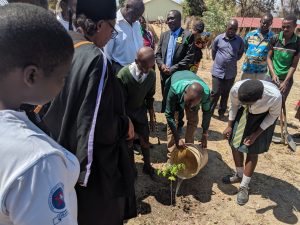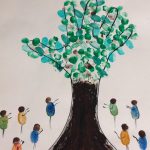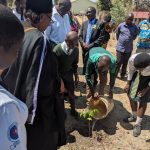Mutake Prize Giving Day 2019. Guest of Honour Speech
It gives me very great pleasure to be here with all of you today this important occasion. It is a great honour and I am greatly humbled to be selected for this great role; a role that I accept with humility and joy.
Introduction.
My name is Shamiso Winnet Mupara, Founder and Executive Director for Environmental Buddies Zimbabwe (EBZ) . EBZ is an organisation whose mission is to repair, restore and protect forests for the benefit of both humans and nature. I did my primary school at Chigonda Primary School, in my home village, Marange. I then went to Hartzell High school, a United Methodist Church Mission School in Mutasa-Nyanga District. I crossed the road to Africa University where I did my first Degree, Bachelor of Social Science in Environmental Studies and Sociology. I later moved to Botswana where I did a Master’s of Science in Environmental Science, specialising in Waste Management and Air Pollution Control.
To the Prize winners, thank you for giving me this chance to share in your moment of happiness and glory. One of your biggest achievements today is that you have made your parents and teachers proud and given them the best possible reward for all the love and care that they have showered on you.
My Tree Planting Journey
I wanted to use my time with you today to speak about something I’ve become passionate about over the years, and something I’ve learnt as I led EBZ. And that is this: how you do things and how you touch lives often matters more to your success than big jobs or fat bank accounts. And all this comes down to character and attitude. Your works will define how well you do, what people think of you and what success looks like in your career – far more than you might expect, and perhaps more than specific jobs you will have in future. Upon leaving this place, some of you will become doctors, nurses, drivers, teachers, engineers, soldiers and political leaders, but what impact, both positive and negative will you have on your community, town, country and the world as a whole. People should think more about how they want to be remembered…what they would want people to say about them after they have departed. Their gifts, talent, their kindness, courage and compassion.
What drove me to starting my reforestation journey, is the need to open dialogue among stakeholders on environmental degradation and how we can all collectively work together to mitigate its effects. The dialogue was and is aimed at protecting resources for children present here today and our future generations. We inherited a land full of resources and we have destroyed it, leaving our children with no resources at all. The error need to be corrected.
Drivers of environmental degradation
Drivers of deforestation and environmental degradation in Zimbabwe include:
• Unsustainable mining activities
• Unplanned and haphazard land reform programs
• Indiscriminate cutting down of trees and veldt fires
• Expansion of agriculture activities
• Expansion of settlements
• Urban sprawl. Domboshava Community is severely suffering from this. We are witnessing the City of Harare encroaching into the Community. More and more people are moving into Domboshava, and they keep cutting down trees to make way for new settlements with little effort to replace them.
Impacts
Our actions have had negative impacts on us and will have negative impacts on our children.
• Food insecurity:
Destruction of the environment is danger to food and nutrition security. The world is full of millions of starving children and no one is paying attention to them. Unsustainable wealth gathering and looting activities have rendered our land unsuitable for food production. To all the parents here today, please take note, nature/indigenous food as well as a well balanced diet leads to good cognitive development and good academic performance. Malnutrition leads to less responsive, less inquisitive and less participation in exploratory behaviour in school and at home. Food is the fuel required by a student to get through a normal day. Chronic hunger prevents students from making the most of a formal education, no matter how hard they try to ignore its effects. The sad truth is that hunger has physical and psychological effects on young people that make learning substantially difficult. A balanced diet provides energy to carry out regular day-to-day activities for students. Without an adequate amount of this energy, students may fall asleep in school or lack the energy to pay attention to an entire day of classes. Children experiencing hunger are more likely to have problems with memory and concentration because they do not have the energy to carry out these functions. Malnutrition can tamper with sleeping patterns as well, making a child too tired to get anything out of a full day of school.
• Loss of animal habitat.
Millions of animals are dying across this planet, because they have nowhere left to go. We have cut down all the trees and poisoned all the water and air, leaving them with no habitat. Gasura and Gomakurira Mountains used to be a haven for both animals and plants, today they stand as empty shells.
• Global warming: Our actions have seen more pollutants being deposited into the atmosphere, leading to global warming. Learning both at home and at school has become unbearable as children can’t perform in excessive heat. In other parts of the world, we have heard reports of people especially children and the elderly dying because of heat waves.
• Air pollution:
Indiscriminate burning of forests every summer and air pollution from industrial activities has left the air we breathe laden with toxic chemicals. Our children are now afraid to breathe the air, because they know what chemicals are in it. Most of them are suffering from respiratory diseases which make the miss school several days in a year.
• Water pollution: Parents who grew up in this village enjoyed fresh fish from nearby rivers, such as Mwenda River, but now it has become a thing of the past. Sand mining to feed into the construction industry and gold panning has turned the perennial rivers into poisoned seasonal rivers. Fish a high protein source of food is now scarce or extinct. Both our livestock and wild animals are dying from drinking poisoned waters. We are destroying both our food and water sources to create a hungry and malnutritioned nation for our children and future generation.
• Extinction of Flora and Fauna.
Animals and plants are vanishing forever. We have robbed our children and the future generations the opportunity of seeing the great herds of wild animals, jungles and rainforests. Our children and future generations will miss out on the important medicinal plants such as Mubvee, cultural plants such as Muhacha and animals that help sustain the ecosystem such as birds, bees, bats and butterflies.
What to do now/ Call to Action
I want to call everyone present here to ACT. WE haven’t lost the war yet. We can still all work together to reverse the effects of climate change and global warming.
• Role of Ministry of Primary and Secondary Education
A special thank you to the Ministry of Primary and Secondary education for incorporating climate change into the new curriculum. Nature studies, global warming and climate change need to be instilled in children from a tender age. Traditionally, photosynthesis was taught as process whereby green plants absorb CO2 from the atmosphere to make their own food. Textbooks then lacked the link between photosynthesis and climate change. Yet today trees have emerged as the readily available solution to absorb CO2 and other gases from the atmosphere. Teachers present here today, you have a duty to provide quality environmental education to students. Quality education is education that fits purpose. In the wake of climate change and global warming, schools have to sensitize students and communities on the causes, impacts and mitigation measures of climate change effects.
• Food Security:
Both the School and community we have to raise awareness on the need to plant trees and protect our indigenous fruits and animals as they form a greater part of our diet. This include; Mazhanje, Chakata, Matamba, Nhunguru, Mbeva, and Birds. They form a bigger part of our organic diet.

• Nutritional Gardens:
In addition we need to have nutritional gardens at household, school and community level. These gardens will save as a reliable source of important vegetables needed in our diet and our children’s diets. Special mention of Santa Heights, a school here in our Community which has a nutritional Garden which feeds their students. Also Goromonzi High school, a school in our District which has a nutritional garden and rears its own cows for beef and chickens. Mutake Primary School is one of the Schools under the Ministry of Primary and Secondary Education Feeding Program. As with other schools, Mutake Primary receives a grain (maize) ration and uses it to make/cook samp / mutakura for the children. The children covered in this program are children from Early Child Development (ECD) up to Grade 4. I passed by the school the other day during feeding times and found students being served plain samp. It’s a diet full of carbon dioxide diet but lacks other essential minerals and nutrients such as other vitamins, fats and protein vital for growth hence the need to establish Nutritional Garden at this school. Vegetables such as leaf vegetables, beans, ground nuts, roundnuts, beetroot, broccoli, peas, butternuts, cow peas, bell peppers, marrows and onions should be added to the maize/ samp to create a well balanced diet.
• Protect our pollinators:
United Nations declared May 20, as World Bee Day. The aim of the UN is to raise awareness of the importance of pollinators, such as bees, the threats they face, their contribution to sustainable development, and how to protect them. Bees and other pollinators such as butterflies, bats and birds are a hidden treasure. Pollinators play an important role in food production, ensuring food security and they are also key to conserving biodiversity and a basis for the Sustainable Development Goals. Domboshava Community, we need to plant and protect more nectaring plants. A special thank you to Mutake Primary School for starting a Bee Keeping projects. I encourage other schools to follow suit.
I would like to remind you that my academic journey as village girl has not been easy, but I have learned several values which have guided me and I would like to share them with you today;
1. SELF DISCIPLINE – Doing the right thing at the right time at the right place
2. BELIEVE IN YOURSELF
3. EDUCATION IS CRITICAL
Make every day a learning opportunity.
To Parents
To the parents gathered here and those who have their children at Mutake Primary School, the school needs your support. Kindly ensure that fees are paid timely to ensure the school buys all the teaching materials they need for the day to day running of the school. To those who can, whenever you are available, offer any service that the school might require.
Let’s celebrate all the students who will be receiving Prizes for excelling in different disciplines here at Mutake Primary. To all the Prize winners, I say congratulations, you fought a good fight and you should continue to do so. Remembering always that at the end of the day what matters the most is how you touch the lives of other people.
We are all a work in progress and we have the privilege of being the driver of our own progress. It does not matter where you are coming from, what matters is knowing where you are and where you want to go. I made a decision that I was going to change people’s lives through restoration of degraded environments. That decision was the most critical decision I ever made with my life to date. Today, I continue to make that same decision with my everyday life. That decision has gotten me to where I am now. The question is, “have you made your decision?
I would like to conclude by thanking every one of you who has managed to be here today. Special thanks to Mawanga ward for hosting us today.
Special thanks again to our:
1. Funding partners:
• Global GreenGrants
• US Forest Services
• His Excellency, Kamal Kalfan (The Honorary Consul of The Sultanate of Oman)
2. Strategic Partners
• Forestry Commission
• EMA
• Ministry of Primary and Secondary Education
• Ministry of Environment, Tourism and the Hospitality Industry
• Hospitality Association of Zimbabwe
• Centre for Natural Resources Governance
• ZELA
Lastly, thank you the Domboshava Community. By being here you have demonstrated that education and nature studies is not a one-man-responsibility, rather a community responsibility. From today I want to urge every individual present here to be the agents of change and adopt a lifestyle of planting trees and protecting our forests. Tree planting and educational programs do not only benefit our schools but also the community around us
Thank you very much, God bless us all and God Bless Mutake Primary School!
- Empowering Marange’s Youth: Celebrating Africa Environment Day at Holy Ghost High School - March 14, 2024
- Sowing Seeds of Hope: Rejuvenating Chiadzwa’s Environment Through Tree Planting” - March 11, 2024
- 5 Years On. Growing Green: Cultivating a Sustainable Future For Macheke’s Children - March 11, 2024




